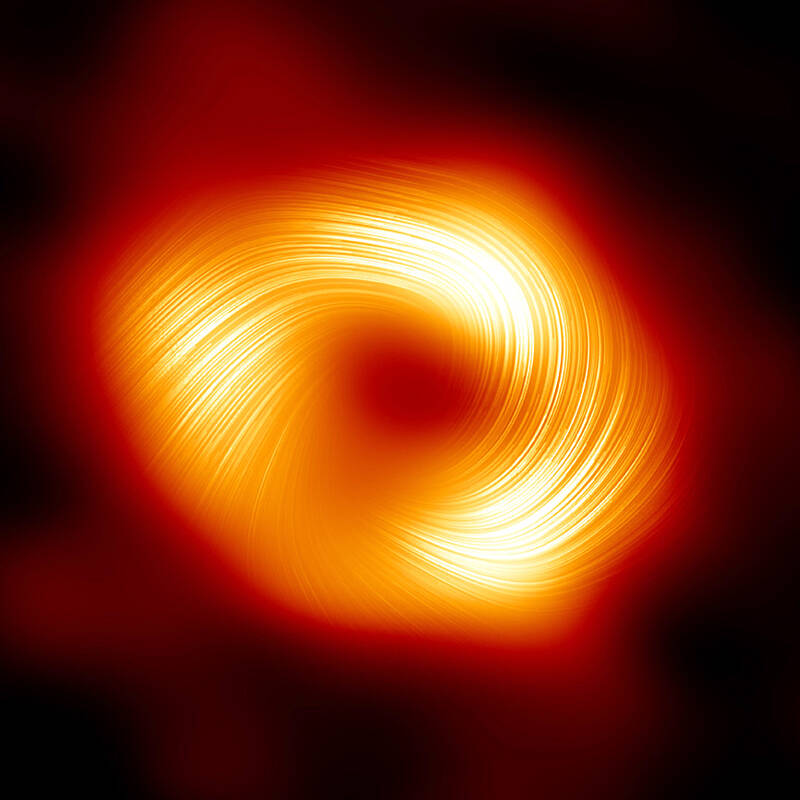Astronomers have identified the largest stellar black hole yet discovered in the Milky Way, with a mass 33 times that of the sun, a study published yesterday said.
The black hole, named Gaia BH3, was discovered “by chance” from data collected by the European Space Agency’s Gaia mission, said Pasquale Panuzzo, an astronomer from the National Centre for Scientific Research at the Observatoire de Paris.
AQUILA

Photo:AFP / South European Observatory
Gaia, which is dedicated to mapping the Milky Way galaxy, located BH3 2,000 light years away from Earth in the Aquila constellation.
As Gaia’s telescope can give a precise position of stars in the sky, astronomers were able to characterize their orbits and measure the mass of the star’s invisible companion — 33 times that of the sun. Further observations from on-the-ground telescopes confirmed that it was a black hole with a mass far greater than the stellar black holes already in the Milky Way.
“No one was expecting to find a high-mass black hole lurking nearby, undetected so far. This is the kind of discovery you make once in your research life,” Panuzzo said in a press release.
The stellar black hole was discovered when scientists spotted a “wobbling” motion on the companion star that was orbiting it.
“We could see a star a little smaller than the Sun (around 75 percent of its mass) and brighter, that revolved around an invisible companion,” Panuzzo said.
Stellar black holes are created from the collapse of massive stars at the end of their lives and are smaller than supermassive black holes whose creation is still unknown. Such giants have already been detected in distant galaxies via gravitational waves.
But “never in ours,” Panuzzo said.
‘DORMANT’
BH3 is a “dormant” black hole and is too far away from its companion star to strip it of its matter and therefore emits no X-rays — making it difficult to detect. Gaia’s telescope identified the first two inactive black holes (Gaia BH1 and Gaia BH2) in the Milky Way.
Gaia has been operating 1.5 million kilometers from Earth for the past 10 years and in 2022 delivered a 3D map of the positions and motions of more than 1.8 billion stars.

‘GREAT OPPRTUNITY’: The Paraguayan president made the remarks following Donald Trump’s tapping of several figures with deep Latin America expertise for his Cabinet Paraguay President Santiago Pena called US president-elect Donald Trump’s incoming foreign policy team a “dream come true” as his nation stands to become more relevant in the next US administration. “It’s a great opportunity for us to advance very, very fast in the bilateral agenda on trade, security, rule of law and make Paraguay a much closer ally” to the US, Pena said in an interview in Washington ahead of Trump’s inauguration today. “One of the biggest challenges for Paraguay was that image of an island surrounded by land, a country that was isolated and not many people know about it,”

DIALOGUE: US president-elect Donald Trump on his Truth Social platform confirmed that he had spoken with Xi, saying ‘the call was a very good one’ for the US and China US president-elect Donald Trump and Chinese President Xi Jinping (習近平) discussed Taiwan, trade, fentanyl and TikTok in a phone call on Friday, just days before Trump heads back to the White House with vows to impose tariffs and other measures on the US’ biggest rival. Despite that, Xi congratulated Trump on his second term and pushed for improved ties, the Chinese Ministry of Foreign Affairs said. The call came the same day that the US Supreme Court backed a law banning TikTok unless it is sold by its China-based parent company. “We both attach great importance to interaction, hope for

‘FIGHT TO THE END’: Attacking a court is ‘unprecedented’ in South Korea and those involved would likely face jail time, a South Korean political pundit said Supporters of impeached South Korean President Yoon Suk-yeol yesterday stormed a Seoul court after a judge extended the impeached leader’s detention over his ill-fated attempt to impose martial law. Tens of thousands of people had gathered outside the Seoul Western District Court on Saturday in a show of support for Yoon, who became South Korea’s first sitting head of state to be arrested in a dawn raid last week. After the court extended his detention on Saturday, the president’s supporters smashed windows and doors as they rushed inside the building. Hundreds of police officers charged into the court, arresting dozens and denouncing an

‘DISCRIMINATION’: The US Office of Personnel Management ordered that public DEI-focused Web pages be taken down, while training and contracts were canceled US President Donald Trump’s administration on Tuesday moved to end affirmative action in federal contracting and directed that all federal diversity, equity and inclusion (DEI) staff be put on paid leave and eventually be laid off. The moves follow an executive order Trump signed on his first day ordering a sweeping dismantling of the federal government’s diversity and inclusion programs. Trump has called the programs “discrimination” and called to restore “merit-based” hiring. The executive order on affirmative action revokes an order issued by former US president Lyndon Johnson, and curtails DEI programs by federal contractors and grant recipients. It is using one of the